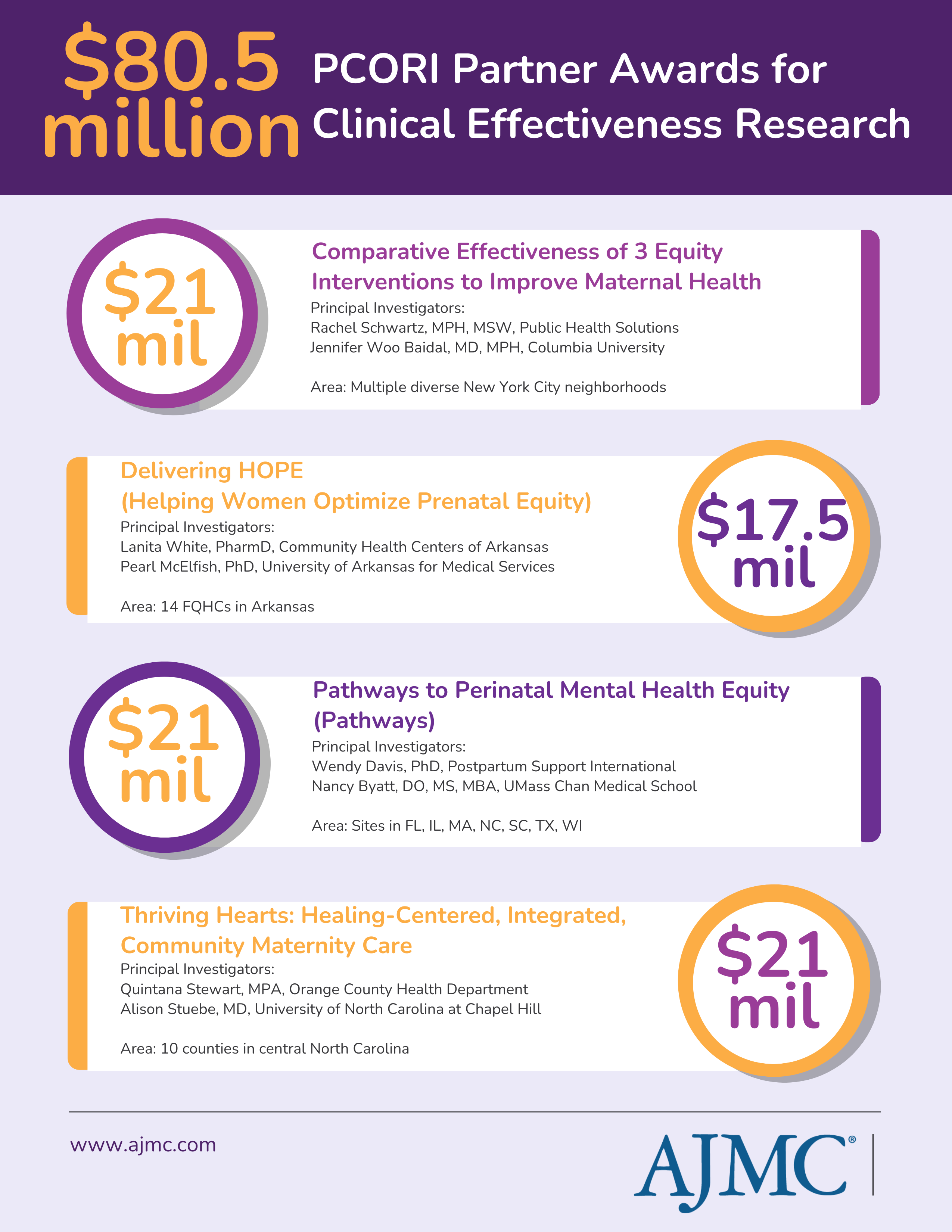PCORI Invests $80.5 Million in Research Addressing Maternal Health Equity

[ad_1]
The Patient-Centered Outcomes Research Institute (PCORI) has allocated $80.5 million in funding for 4 patient-centered comparative clinical effectiveness research (CER) studies targeting maternal morbidity and mortality. These studies, part of a broader initiative involving 30 projects, focus on both health care and social determinants, particularly in populations facing maternal health disparities.1
Stethoscope and piggy bank | Image Creidt: Atlas – stock.adobe.com

The funding, awarded through the innovative PCORI funding opportunity known as Partner, emphasizes equal partnerships between research institutions and community organizations, according to the announcement. These partnerships will lead the 4 large-scale studies, each tackling unique challenges related to maternal health in various communities.
“The usual approaches to health research and health care have not sufficiently addressed the alarming and worsening national crisis of maternal death and severe illness,” Nakela L. Cook, MD, MPH, PCORI executive director, said in a statement.
Novel Approaches to Tackle Inequities
The studies will investigate populations disproportionately affected by adverse maternal health outcomes, including Black individuals, Hispanic and Latin American communities, residents of rural areas, and those with lower incomes. These projects depart from conventional clinical trials by involving dual principal investigators from research institutions and community organizations to co-lead assessments.
Recognizing the multifaceted nature of maternal health challenges, the studies will aim to evaluate interventions addressing both health care and social determinants of health. Each project will undergo a planning phase of up to one year, followed by a research phase of up to 5 years.
“Patient-centered comparative clinical effectiveness research that responds to the many challenges concurrently facing pregnant individuals and those who care for them has the capacity to answer questions about which combinations of approaches can best resolve some of these complex maternal health care challenges that have for too long defied solutions,” Cook continued.

Geographic Scope and Focus Areas
The studies will be conducted across a diverse range of US regions, including rural and urban areas in the Northeast, Midwest, Mid-Atlantic, and the South. They will compare various practice-level and community- and home-based interventions, addressing common challenges facing pregnant individuals and new mothers.
“Delivering HOPE (Helping Women Optimize Prenatal Equity)”
This research will focus on addressing maternal health challenges in Arkansas, where poor outcomes are prevalent, especially in rural and low-income areas. Nearly half of Arkansas women experience excessive gestational weight gain, a major concern for those with pre-pregnancy overweight or obesity.2
Partnering with the University of Arkansas for Medical Sciences and the Community Health Centers of Arkansas, the study seeks to improve pregnancy and postpartum care, particularly for diverse populations in both rural and urban settings.
The study proposes a randomized control trial comparing 2 interventions—Delivering HOPE and enhanced standard of care—emphasizing nutritional counseling; Special Supplemental Nutrition Program for Women, Infants, and Children and Supplemental Nutrition Assistance Program enrollment; and safety-net food referrals. Delivering HOPE includes grocery delivery of healthy foods to participants’ homes.
“Pathways to Perinatal Mental Health Equity (Pathways)”
This research addresses the rising prevalence of mental health issues as the leading cause of death during pregnancy and postpartum in the US. Aimed at evaluating effective care models, the study will compare a health system-focused approach with a health care-community partnership in 32 obstetric practices.3
Both strategies include screening, assessment, treatment, and peer support for perinatal mood and anxiety disorders. Led by Postpartum Support International and UMass Chan Medical School, the objective is to identify implementation barriers and facilitators. With a diverse team and advisory councils, the research focuses on mentorship programs for underrepresented individuals. Results will guide resource allocation for mental health care during pregnancy and postpartum.
“Thriving Hearts: Healing-Centered, Integrated, Community Maternity Care”
The Thriving Hearts study in North Carolina aims to address high rates of hypertensive disorders of pregnancy (HDP) through a 5-year program. In collaboration with local health departments, communities, families, and researchers, the initiative focuses on individual patients (Mama Hearts Care Kits and text messages), health care teams (workshops on trauma-informed care), and communities (community health workers and mini grants).4
The study, spanning 10 counties, assesses HDP prevention, health outcomes, and healthcare worker well-being. Led by lived experiences and diverse expertise, the research aims to provide insights for community advocates, health leaders, and policymakers supporting growing families.
“Comparative Effectiveness of Three Health Equity Interventions to Improve Maternal Health”
This research addresses maternal health disparities linked to unhealthy weight gain during and after pregnancy. The study compares 3 counseling approaches for pregnant patients to promote maternal healthy weight. The interventions involve usual care, an intervention with grocery delivery and support for physical activity, and a community-based approach led by health workers.5
Involving 1500 pregnant patients across 3 New York City health systems, the study will measure outcomes such as maternal return to pre-pregnancy weight, food security, and cardiometabolic health. Collaboration among patient partners, community stakeholders, clinicians, and researchers is a key aspect, ensuring diverse perspectives throughout the study.
“These funding awards mark an important advancement of PCORI’s longstanding leadership in engaging patients and those who care for them in all aspects of comparative clinical effectiveness research to ensure that results are relevant, useful, and impactful,” Harv Feldman, MD, MSCE, PCORI deputy executive director for patient-centered research programs, stated. “We look forward to seeing the impact the studies’ findings will have for maternal health across the United States, particularly among populations that continue to disproportionately experience adverse outcomes.”1
Details of all newly funded studies and projects can be found on the PCORI website, with funding awards subject to formal review and approval. With this recent investment, PCORI has now contributed over $4.5 billion to patient-centered CER and other impactful projects.
References
1. PCORI approves $80.5 million for health research using novel approaches to tackle social and clinical care factors that contribute to maternal health inequities. News release. PCORI News Hub. November 28, 2023. https://www.pcori.org/news-release/pcori-approves-80-million-health-research-using-novel-approaches-tackle-social-and-clinical-care-factors-contribute-maternal-health-inequities
2. Delivering HOPE (Helping Women Optimize Prenatal Equity). PCORI. Accessed November 28, 2023. https://www.pcori.org/research-results/2023/delivering-hope-helping-women-optimize-prenatal-equity
3. Pathways to Perinatal Mental Health Equity (Pathways). PCORI. Accessed November 28, 2023. https://www.pcori.org/research-results/2023/pathways-perinatal-mental-health-equity-pathways
4. Thriving Hearts: Healing-Centered, Integrated, Community Maternity Care. PCORI. Accessed November 28, 2023. https://www.pcori.org/research-results/2023/thriving-hearts-healing-centered-integrated-community-maternity-care
5. Comparative Effectiveness of Three Health Equity Interventions to Improve Maternal Health. PCORI. Accessed November 28, 2023. https://www.pcori.org/research-results/2023/comparative-effectiveness-three-health-equity-interventions-improve-maternal-health
[ad_2]
Source link
